It's all about the classical music composers and their works from the last 400 years and much more about music. Hier erfahren Sie alles über die klassischen Komponisten und ihre Meisterwerke der letzten vierhundert Jahre und vieles mehr über Klassische Musik.
Sunday, November 20, 2022
Madame Butterfly. Coro a boca cerrada. Puccini.
Barbra Streisand / Donna Summer - No More Tears (Enough is Enough)
28,944,819 views Jun 23, 2009
Barbra Streisand sings the extended version of one of her first disco hits with Donna Summer in 1979. The song reached #1 and was guaranteed Platinum. (This is the 8 Minute Extension of the original song).
© of Columbia Records
Friday, November 18, 2022
Who Says Music Shouldn’t be Political? Trailblazing Composer Jennifer Jolley
by Janet Horvath, Inteerlude
Composer, conductor, and professor person, Jennifer Jolley believes her music can and should address current and provocative subject matter such as political issues. Consider the 2017 piece The Eyes of the World Are Upon You. The titles of her works indicate what this composer is about. Jolley lives in Texas. The piece bubbled up for her as a direct result of the 50th anniversary of the University of Texas tower shooting and the new campus carry laws allowing those with concealed handgun licenses to carry concealed handguns on public university campuses across the state of Texas.

Jennifer Jolley © Liz Glenn
The Eyes of the World Are Upon You is written for massive forces—huge numbers of brass and winds, and multiple percussion instruments. A mournful English horn opens the piece. Gradually Jolley increases the layers of sound by adding more wind instruments. The brass gradually contributes to the volume. An abrupt cut-off clears the air for the chimes to toll alone, arrhythmically, but the entire band interrupts fortissimo destroying the vigil with dissonance. The calm returns. At the end of the piece, the conductor stops to allow the lone English horn to plaintively finish leaving us to ponder the sorrowful message.
In 2018 Jolley wrote Prisoner of Conscience, a collaboration with librettist Kendall A. It comprises fourteen movements for vocal ensemble. The inscription “a crude homage to three heroes unjustly incarcerated, fighting a corrupt system…” powerfully evokes the detention of innocents. This is a highly unusual and unique work. The piece, for female voices only, a cappella, is spellbinding.
Prisoner of Conscience addresses Vladimir Putin directly in a series of searing indictments especially in the spoken movements such as Pussy Riot’s Performance. Each movement utilizes different techniques. The first segment, The Eve of Destruction sets the stage in a snappy rhythm with the lyrics, “Biting an apple, over and over again…”. With rich harmonies and an arresting message, the movement becomes a round. Then This Trial is Highly Typical, an intense denunciation, spoken by one of the performers, precedes a beautiful and religiously charged movement in the style of a Gregorian chant. I recommend a parental advisory for some of the next movements that include profanities. Oh Bondage, Up Yours!
In Death to Prison, Freedom to Protest, one of the vocalists reiterates a pulsing propulsive accompaniment “Sh-Sh-Sh”. A spoken voice enters alongside the vocal harmonies, and a lone soprano sings a gorgeous melody over repeated rhythmic hums. One last movement is spoken, “open all the doors… taste freedom with us…” before the finale Prisoner of Conscience a contemplative conclusion that fades out humming. As a performer myself, I know that performing this work—at almost 30 minutes in length and requiring so many diverse techniques—is very challenging. The recording is a highly effective rendition of this mesmerizing composition and I can only imagine how effective it would be in person.
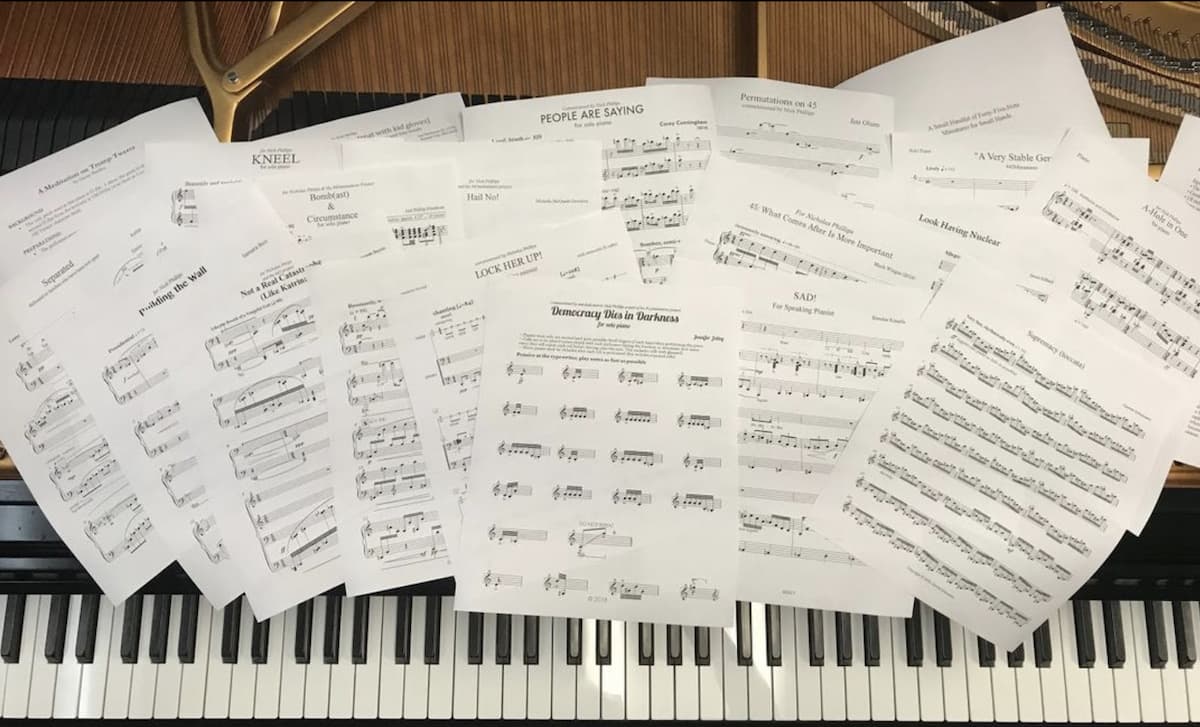
Some compositions by Jolley © Jennifer Jolley Instagram
Jolley’s eloquent and riveting music written for concert bands dispels every notion of what we typically might imagine band music to be.
March! was commissioned by the American Bandmasters Association. Imagine all the marches written to galvanize citizens during war. Jolley has used this form to illustrate ongoing political conflicts between North and South Korea. It has all the features of a typical march—a stirring rhythm, cymbals crashing, snare drum smashing, and brash brass wailing. The Sousa-like opening gradually decompensates. There are several abrupt stops, and suddenly an eerie audio announcement interrupts. The effect, combined with high pitched electronic dissonances, makes our stomachs churn. A melodic chorale follows, lovely human voices gently undulating. But that too is brutally interrupted and drowned out by the insistent snare drums. March! raises questions in an enthralling fashion.
In the mix of Jolley’s works is a fabulous solo cello piece entitled Compulsive Bloom brilliantly played by cellist Matt Haimovitz. Much of it consists of vehement octaves, played ponticello or on the bridge so the sound has a harsh edge to it. Alternating sections of high whistling sounds in harmonics give it contrast. It’s a fine addition to the solo cello literature.
Jolley is currently an assistant professor of music theory and composition at CUNY Lehman College, has been a composition faculty member at Interlochen Arts Camp since 2015, and she held positions at Texas Tech University and Ohio Wesleyan University. She has written a blog full of thought-provoking ideas and is a contributing writer to the new music news site I CARE IF YOU LISTEN powered by the American Composers Forum.
Jennifer Jolley is not afraid to provoke, to address political issues, to experiment, and she is the composer to watch.
Thursday, November 17, 2022
This 1919 cartoon accurately predicted mobile phones at concerts over 100 years ago...
By Kyle Macdonald, ClassicFM
A cartoon in the Daily Mirror from the early 20th century almost unbelievably anticipates the sound of ‘pocket telephones’ in the concert hall.
We’ve all experienced it. Sitting in a concert hall or theatre, the audience is hushed, and the music at a beautiful pianissimo...
And then *ding ding ding*, a mobile phone starts to sound of digital beeps or that all-too-familiar marimba ring tone.
But it turns out that English illustrator William Haselden (1872–1953) predicted it all, a whole century earlier, in a cartoon titled When we all have pocket telephones, published in The Daily Mirror in 1919 when the telephone was a very new invention.
It asked: what if we had a portable, pocket or *mobile* telephone with us in our day to day? And how might they interrupt concerts? It’s all quite prophetic...
Read more: Did you know the original Nokia ringtone comes from a piece of Spanish classical guitar music?
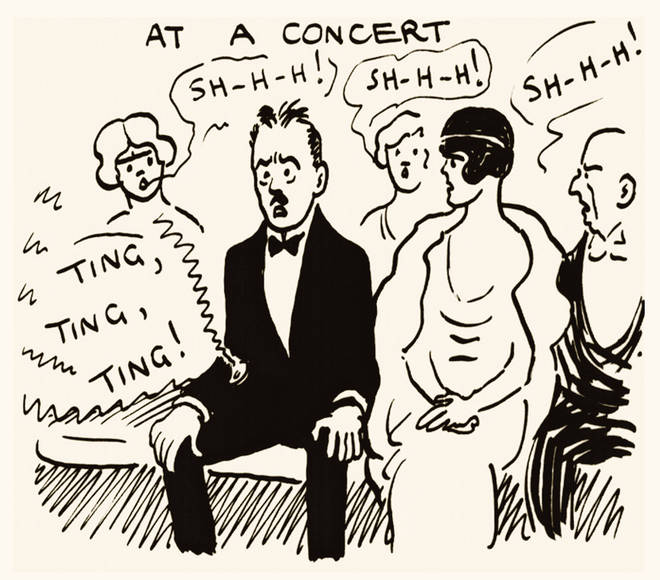
The cartoon was placed alongside other situations where this ‘pocket telephone’ might prove a personal annoyance and social nuisance: whether it be on a busy train, when you’re in a hurry, with babies, or even when you’re at the alter.
Take a look at the full set of the remarkable prophecy below:
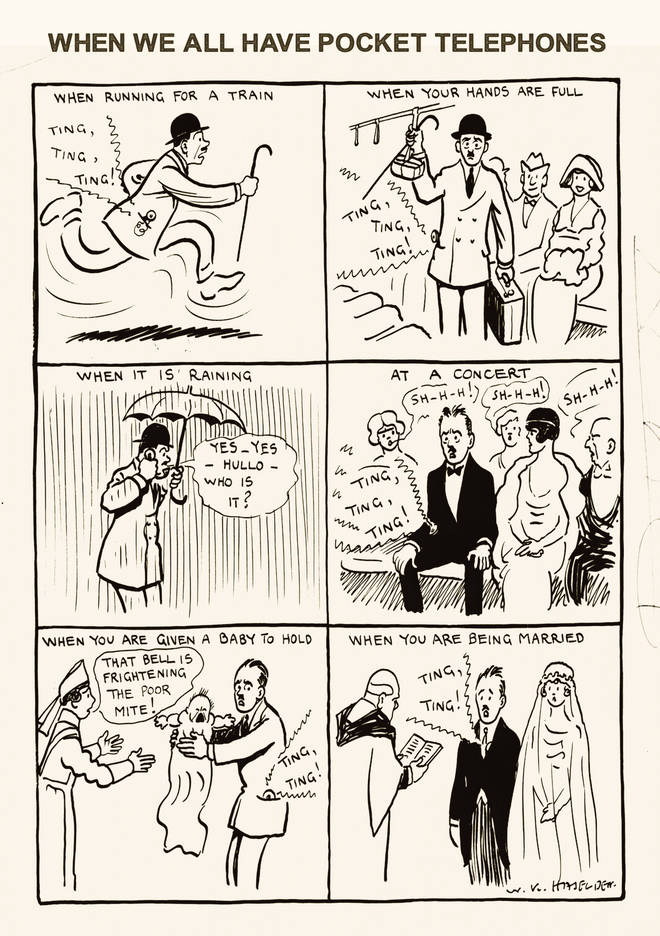
Haselden drew political cartoons and caricatures, but became most famous for pieces of social commentary on middle-class fashions and manners. His illustrations, like this one, were often drawn over a number of panels, for which he has been viewed as the father of British strip cartoon.
We wonder what he might have thought if he was instantly transported to a concert 100 years into the future, and hearing the now omnipresent announcement before performers take to the stage: “Could we please ask you all to set your phones to silent”.
Rats have capacity for rhythm and can keep time to Mozart works, new study reveals
By Maddy Shaw Roberts, ClassicFM London
Scientists have found that rats enjoy the rhythm of Mozart’s music and will bop along to it when given the chance.
Rats have a sense of rhythm according to a new study conducted by scientists at the University of Tokyo.
In the study, published in the journal Science Advances, 10 rats were fitted with wireless, miniature accelerometers which were used to measure the slightest head movements.
They were played one-minute excerpts from Mozart’s Sonata for Two Pianos in D Major, at four different tempos: 75 percent, 100 percent, 200 percent and 400 percent of the original speed.
While the main study focused on the Mozart sonata (watch it performed spectacularly by Daniel Barenboim and Martha Argerich below), four other tracks were also played: ‘Born this Way’ by Lady Gaga, ‘Another One Bites the Dust’ by Queen, ‘Beat It’ by Michael Jackson and ‘Sugar’ by Maroon 5.
Rats were found to easily keep in time with songs played at 132BPM, but they enjoyed it less when the music was slowed down or sped up.
Lead author of the study, Professor Hirokazu Takahashi, said: “To the best of our knowledge, this is the first report on innate beat synchronisation in animals that was not achieved through training or musical exposure.
“Rats displayed innate – that is, without any training or prior exposure to music – beat synchronisation most distinctly within 120-140 bpm – to which humans also exhibit the clearest beat synchronisation.
“The auditory cortex, the region of our brain that processes sound, was also tuned to 120-140 bpm, which we were able to explain using our mathematical model of brain adaptation.”
The Japanese study compared the results from the rhythmic rodents with 20 human volunteers, and detected a sense of rhythm in both species. Professor Takahashi added that similar, past studies have suggested the ability to enjoy a beat is common in other animals too.
“Music exerts a strong appeal to the brain and has profound effects on emotion and cognition,” Takahashi added.
“After conducting our research with 20 human participants and 10 rats, our results suggest the optimal tempo for beat synchronisation depends on the time constant in the brain.
“This demonstrates the animal brain can be useful in elucidating the perceptual mechanisms of music.”
Wednesday, November 16, 2022
Celebrating 40 years of Martin's music
Martin Nievera is considered one of the greatest stars in the history of
Philippine entertainment.
Four decades has passed since one Martin Nievera returned to the Philippines and ventured into the entertainment business. Fittingly, the would-be Philippine Concert King will celebrate the huge milestone on Saturday, November 19 at The Theatre at Solaire. Titled M4D, it promises to be a career spanning concert.
As the son of legendary balladeer Bert Nievera, Nievera had dreamt of following in his father's footsteps since childhood. After he was tapped to sing background to Barry Manilow and besting over four thousand contestants in a California State talent competition, he decided he had what it takes to be a singer.
Vicor Music Corporation signed Nievera to a recording contract in 1982. Label president Vic del Rosario, Jr. then handpicked the Vehnee Saturno composition "Be My Lady" to be part of the artist's first album, "Take 1," released in 1983. The single turned out to be a massive hit and sparked the beginning of four decades worth of other hits and counting.
Considered Martin Nievera classics besides his beloved anthem are "How Can I," "Each Day with You," "Pain," "Paradise," "Please Don't Throw My Love Away," "Christmas Won't be the Same without You," "Say That You Love Me," "Ikaw ang Lahat sa Akin," "Ikaw ang Aking Pangarap," "Forever," "You are My Song," "Ikaw," "Kahit Isang Saglit," "Ikaw Lang ang Mamahalin" and so many others across a total of 28 staggering albums.
Nievera's success as a recording artist of course allowed him to venture into other areas of entertainment. Besides singing, he also became a lyricist for songs like "You Are My Song" and "Forever," both sung by Regine Velasquez. He likewise appeared in a string of movies like "Always and Forever and "Si Mister at si Misis." He further dominated television as a host starting with "Penthouse Live" in 1984 down to "Martin and Pops Twogether," and his successful solo gig "Martin After Dark" among others.
But with music ever his first love, Nievera continued to mount bigger concerts every time so much so that he deservingly earned the title Concert King.
Fast forward to present, it is no surprise that Martin Nievera is considered one of the greatest stars in the history of Philippine entertainment. Despite and amid his success, he continues to work because showbiz is where he thrives. Sundays for him will always mean doing "ASAP" on ABS-CBN's platforms and like before, he is only happy to accept offers to do concerts here and abroad and keep sharing his beautiful music and madness.
Post anniversary concert, Nievera is fully booked for shows near and far but promises he will complete the new album — his 24 — he is working on.
To inquire about few remaining tickets for MD4, call Viva Live at Find out more about the talent at 8632-8687-7236.
Subscribe to:
Posts (Atom)
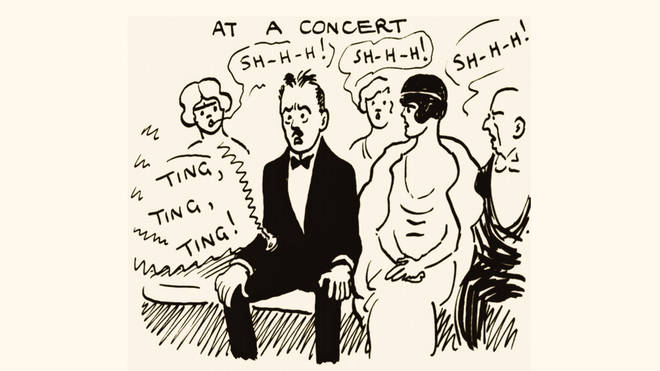


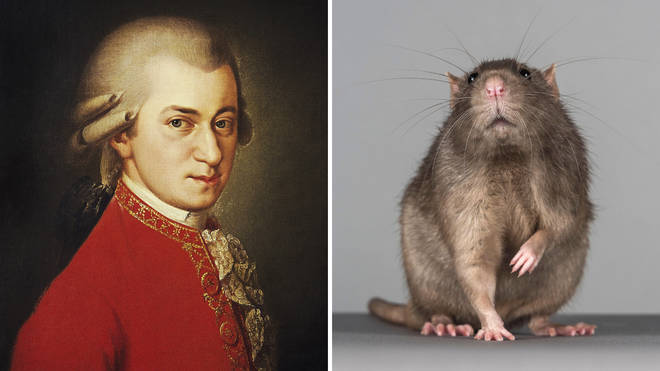
.webp)